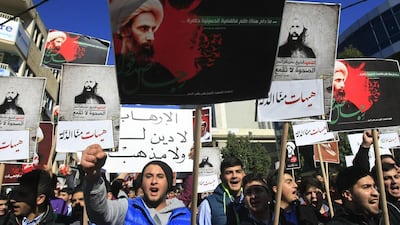Economic sanctions on Iran have been lifted. The removal of sanctions, which will release billions of dollars worth of frozen assets and bring Iran in from the cold, comes exactly two weeks after a diplomatic spat with Saudi Arabia brought the region to boiling point.
Both of these events could have profound international implications for Saudi Arabia. After the diplomatic row, the kingdom came under fierce media attack and was generally portrayed as an irresponsible regional player that deliberately provoked Iran by executing the Saudi religious cleric Nimr Al Nimr. Such depictions do not bode well for the kingdom as it prepares for the entry of a regional rival into the international arena.
Broadly speaking, much of the punditry about Saudi Arabia and the Gulf states at large tends to rely on old facts and myths – mostly dating back to the 1990s.
Perpetuating old stereotypes about Saudi Arabia’s foreign policy ignores the progress –and indeed the drastic changes – that have taken place over the past decade. More importantly, they also reduce Iran’s role in the neighbourhood to a geopolitical rivalry with its neighbours, rather than casting this role in its true light, as an aggressive sectarian agenda that claimed the lives of thousands of people and perpetuated conflict and civil strife.
To better understand Iran’s behaviour, consider the policies of the two countries since the eruption of the Arab uprisings five years ago.
Let’s start with Syria. It took Saudi Arabia three months to publicly condemn the bloody military campaign launched by Bashar Al Assad against peaceful protesters in 2011. Syrians at the time expressed anger about the silence of the kingdom and Gulf media channels that had intensively covered other Arab uprisings. The reason was because Riyadh had become closer to the regime in Damascus in the years before the uprisings. Even after the late King Abdullah finally spoke against the regime’s crimes, Riyadh’s support for the opposition was minimal throughout 2012.
Even now, Saudi financial support for the rebels has remained restricted to a US-backed scheme funded by other countries in the region and in Europe. The only religious group with financial links to Saudi Arabia is Jaish Al Islam which, as I explained on these pages last month, has been the most consistent and effective force against ISIL. Most of the nationalist opposition forces that were formed or organised to fight ISIL were also directly bankrolled by Riyadh, such as the Syrian Revolutionary Front.
Additionally, Saudi Arabia also supported two political blocs led by Christian oppositionist Michel Kilo and former National Coalition leader Ahmad Jarba to counter the influence of the Muslim Brotherhood.
In Iraq, Saudi Arabia maintained a hands-off approach to the conflict there. In private conversations, it was opposed to working even with Sunni rivals of ISIL, whether tribal or religious activists. After ISIL’s takeover of Mosul in 2014, Riyadh offered $500 million (Dh1.8 billion) to displaced Iraqis “regardless of their sect”, and moved to resolve border disputes with Iraq and resume diplomatic relations. It opened its embassy in Baghdad last month after a 25-year diplomatic hiatus.
If a cynical sectarian game was Saudi Arabia’s intention with the execution of Nimr Al Nimr, as some have claimed, opening an embassy in Iraq, where sectarian tensions are the highest in the region, was not smart.
In Yemen, where Saudi Arabia is seen as most aggressive, observers forget that they once spoke about a “Yemen model” that presumably saved the country from becoming another Libya and Syria. Saudi Arabia supported a peaceful transition in Yemen. When the Houthis disrupted the process and took over Sanaa, it took Saudi Arabia six months to lead a military intervention with the stated goal of restoring the political process.
In contrast, Iran did not attempt to mediate a political transition in Yemen or even accommodate popular demands in Syria. On the contrary, it supported an aggressive military campaign from the outset, with the help of operatives disguised as “pilgrims”.
Its policy caused the death of nearly 300,000 people and the destruction of a country that longed for freedom. That policy also created the circumstances for the rise of ISIL as a terrorist group that spans two countries and expands beyond. That policy – backed by militias from Lebanon and Iraq – entrenched sectarian tensions in unprecedented levels.
Tehran’s claims that it came to Syria not on sectarian grounds but to back a legitimate government are betrayed by the support for Hizbollah at the expense of the Lebanese state. The tools for its sectarian agenda are religious zealots hailing from Afghanistan, Yemen, the Gulf, Iraq, Syria and Lebanon, who often engage in the same activities as extremist groups like ISIL.
Saudi Arabia, on the other hand, is widely blamed in the region for working against religious Sunni groups throughout the region, including the Muslim Brotherhood, ISIL, Al Qaeda and its Syria affiliate Jabhat Al Nusra, all of whom were designated by Riyadh as terrorist groups.
Over the weekend, Al Qaeda issued a statement by its leader Ayman Al Zawahiri entitled Al Saud: the Killers of Mujahideen. The last two speeches by ISIL’s leader, Abu Bakr Al Baghdadi, also reserved special ire for Saudi Arabia over its operations in Yemen and the antiterrorism Islamic Coalition that was formed in Riyadh last month.
Whatever one’s stance on the rivalry between Saudi Arabia and Iran, the former's moderate foreign policy has been in clear display for many years.
Unfortunately, Iran is an outright regional bully that seeks to force its sectarian agenda on the region through its “pilgrims” of hate and savagery.
Hassan Hassan is associate fellow at Chatham House’s Middle East and South Africa programme, a non-resident fellow at the Tahrir Institute for Middle East Policy and co-author of ISIS: Inside the Army of Terror
On Twitter: @hxhassan

